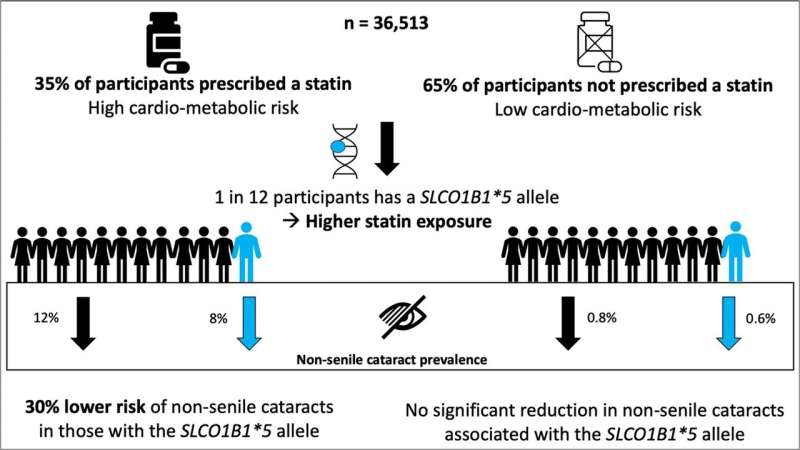This article has been reviewed according to Science X's editorial process and policies. Editors have highlighted the following attributes while ensuring the content's credibility:
fact-checked
trusted source
proofread
Genetic study of British south Asians challenges previous work linking statin use to increased cataract risk

New research, led by Queen Mary University of London, has unpicked the threads linking statin use, ethnicity and the risk of developing young-onset cataracts in British people with South Asian ancestry.
The study, recently published in The Pharmacogenomics Journal, addresses a critical knowledge gap by focusing on participants of British South Asian descent, who are typically underrepresented in genetic studies and highly likely to have a cardio-metabolic disease, which is both a statin indication and a risk factor for young onset cataracts.
Statins are lipid-lowering medicines that are used to lower cholesterol levels in the blood and are widely prescribed. The reported association between statin use and cataract risk is controversial. While some large observational studies and meta-analyses have found statins to have a protective effect on cataracts, others have found an association with increased risk of cataracts, and many studies have found no significant association in either direction.
South Asian ancestry populations suffer from a particularly high prevalence of cardiometabolic disease, therefore exploring statin-related adverse drug reactions in this population is important.
This study used patient data from Genes & Health a project launched by Queen Mary which has recruited more than 55,000 South Asian research volunteers from East London, Manchester and Bradford.
The research revealed that a specific genetic variant, which leads to heightened statin exposure, is independently linked to a reduced risk of developing cataracts at a younger age. This genetic variant is present in approximately one in every twelve participants and is known to have a higher prevalence among individuals of European ancestry.
Dr. Emma Magavern, from Queen Mary University of London, emphasized the significance of the findings, stating, "This is the first study of its kind to use genetic markers of statin exposure to explore the connection between statin use and cataracts. It finds that the genetic variant known to lead to higher statin exposure is independently associated with lower young-onset cataract risk. Prior observational studies have found associations between statin use and increased cataracts, however, this is likely due to the risk factors shared between statin indications and cataracts."
This study refutes previous claims of statins being a cause of cataracts and instead suggests that individuals with the genetic variant associated with higher statin exposure have a decreased risk of developing cataracts.
More information: Emma F. Magavern et al, SLCO1B1*5 is protective against non-senile cataracts in cohort prescribed statins: analysis in a British-South Asian cohort, The Pharmacogenomics Journal (2023). DOI: 10.1038/s41397-023-00307-w




















